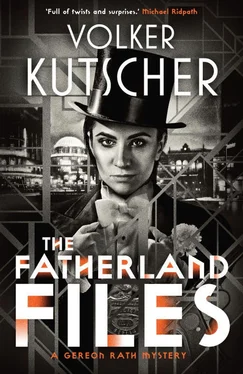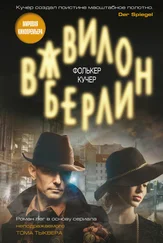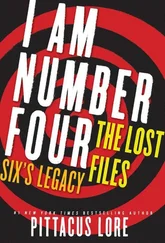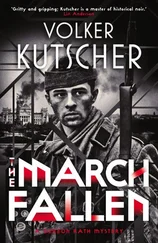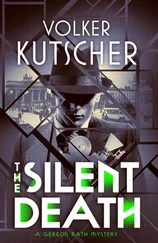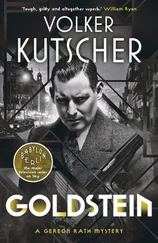‘I have money.’
Sobotka’s stash was still hidden in the forest by Allenstein, near a village called Altschönberg, his birthplace. Fifteen thousand marks. Money for Sobotka to start over once he was out; money for you to start over now, yourself.
‘There’s more.’
‘We can get hold of anything.’
‘Even tubocurarine?’
‘What’s that?’
‘An anaesthetic adjuvant. They’re using it for research purposes at the University Clinic, Department of Anaesthetics. Lange Reihe.’
‘We don’t need the address.’ You recall the suspicion in his eyes as he looked you up and down. ‘It won’t come cheap.’
‘I told you: I have money.’ He looked down wide-eyed as you laid a thousand-mark note on the desk. ‘Four more, if you can get hold of everything, and grant me a small favour.’
‘We don’t kill people.’
‘No.’ You showed him the iron shackle under the right trouser leg of your elegant new suit. ‘I need to get rid of this. Today.’ You knew then that you had won his respect. ‘I need some addresses. Four East Prussians, who moved west from Marggrabowa.’
‘It’s called Treuburg now.’
You nodded. You were aware that the world had changed. You passed a note across the desk containing the names, along with your additional requests.
You are rid of the shackles the same day, and, two weeks later, you have everything you need. A new identity, four addresses, and enough tubocurarine to kill an elephant.
The rattle of the train keeps you awake, eating away at your thoughts and rekindling unhappy memories.
The vibration of the tracks.
The railway line in the pine forest near Wartenburg.
Sobotka on the crossties, hands on the back of his neck, the ankle chain that binds you straddling the shiny metal.
You pull your legs outwards so that the chain sits tight as possible on the tracks.
By now the vibrations come paired with other noises. You choose not to protect your neck, covering your ears as the train rushes towards you, growing ever louder. You cover your ears and pull the chain tight, awaiting the inevitable.
Even covering your ears, the train is so loud that you start to shake; beads of sweat run down your skin, making you grow cold, as the wind rages all around.
You close your eyes and wait for it to be over – but it takes an age.
A cacophony sweeps over you, a violent screech, thunder and rumble, and you are shaken by a painful blow to your leg.
You wait for the ear-splitting roar to die, not daring to move. You hear more screeching, further and further away until, at last, it subsides.
You open your eyes. Pain in your right leg. Instinctively you reach for it, but feel no wound. The chain has loosened, it must have struck against your shin, a bruise, nothing more.
You’ll limp, perhaps, but you’ll carry on. Both of you must now make yourselves scarce. The driver has halted the train and will soon sound the alarm. It will take time for them to get out here and pick up your trail, but it won’t take forever.
You sit up. Your triumphant grin fades when you gaze towards the track bed.
Sobotka’s powerful frame looks almost unscathed, but he is now lying on his back. A hand is missing, so too his face.
Something struck his head, or perhaps his head met with the onrushing train. All you know is that his grin, which could banish all dread from this world, has been replaced by a bloody pulp.
You feel sick, but the fear makes you act, the fear of being locked up again.
Someone is thinking in your place as you remove your prison garb and switch it with Sobotka’s. Swap your number 466/20 with his 573/26.
Then you strike out into the forest, moving as fast as you can. Before the driver arrives, before the search party arrives, before the dogs arrive. Before they find the dead man with the prison number 466/20.
You run through the forest and scream; despite everything that has happened, you are overcome by a hitherto unknown sense of exhilaration. It is freedom you feel: a freedom that only death can provide.
Rath had no choice but to lie. It was true that he couldn’t meet her for lunch in the police canteen, he just hadn’t been entirely honest as to why.
‘I’m out in the field,’ he had said, and he had indeed canvassed several of the witnesses who claimed to have seen Jakub Polakowski in Berlin over the weekend. Still, he was finished with that long before the lunch break. As predicted, all three visits were in vain. An old lady suspected her neighbour, whose radio was constantly blaring; an unemployed bookkeeper’s report had clearly been driven by boredom; which left only the third witness, a kiosk owner, who claimed to have seen Polakowski at Schlesischer Bahnhof on Friday. When Rath showed him the photo, which was considerably sharper than the copy in the newspapers, he nodded. ‘That’s him, I’d wager. Saw him Friday morning carrying a small case.’
The man couldn’t say where Polakowski was headed, couldn’t even remember the exact time. Rath made a few notes, but held little hope of picking up his trail. You could go almost anywhere from Schlesischer Bahnhof, which had its own S-Bahn platform.
He’d finished his list around twenty past eleven, but chose not to return to Alex. Instead he’d lied to Charly, on the day they’d made their engagement public in the Castle. Gennat had announced it that morning in briefing, and Harald Dettmann gazed stonily in Rath’s direction as others joined the applause.
They could have been in the canteen toasting the fact that everyone knew. Instead, he was moving through Friedrichshain towards the banks of the Spree. Walking down Mühlenstrasse, cigarette dangling and hands in his coat pockets, he proceeded towards the Oberbaum Bridge and the Osthafen where, this time last year, Red Hugo, head of the Berolina Ringverein, had vanished without trace.
The black Adler sedan that rolled past and stopped on the street corner looked out of place in a neighbourhood like this, characterised as it was by industry, poverty and petty crime. Even so, its paintwork didn’t have so much as a scratch. Everyone here knew who the vehicle belonged to, as, of course, did Rath.
The driver’s door opened, and a well-dressed Chinese emerged. The man wore a long, black ponytail under his hat, and nodded briefly at Rath as he opened the rear door.
‘Thank you, Liang,’ Rath said, taking his place on the back seat, next to a powerfully built man who put the papers he’d been reading to one side.
‘Long time, no see, Inspector,’ said Johann Marlow.
‘I’ve been out of town.’
‘Might I invite you for lunch? There’s a Chinese restaurant close by.’
‘Thank you, I already have plans.’
‘Let’s take a little drive.’ Marlow gave Liang a signal and the sedan started rolling. They turned onto Warschauer Strasse.
‘Thank you for meeting me like this,’ Rath said, though it went against the grain to express gratitude to such a man. He needed his help though, so had grasped the nettle once more. As time passed he grew increasingly inured to its sting.
Marlow had always behaved honourably towards him, which was more than could be said for some of his so-called colleagues. Arseholes like Harald Dettmann and Frank Brenner, or traitors like Bruno Wolter and Sebastian Tornow. Even a man like Andreas Lange didn’t always play with an open hand; the same went for Böhm and Gennat, of course, to say nothing of the various police commissioners he had served under.
‘What can I do for you?’
Rath lit a fresh cigarette. ‘Where would I go if I was looking for a contract killer, here in Berlin?’
Marlow laughed. ‘You mean to dispose of your superiors? You won’t get any help from me or Berolina for that kind of service.’
Читать дальше
